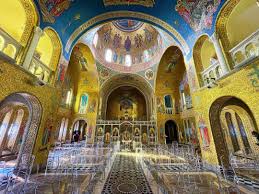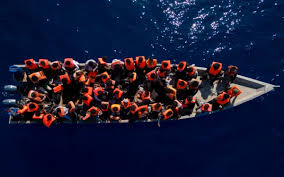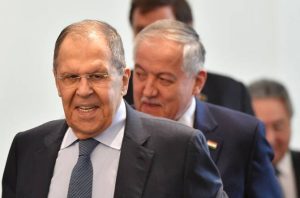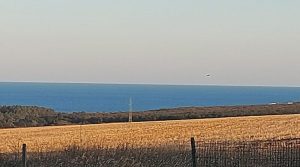D-Day veterans among the very greatest Americans: Trump
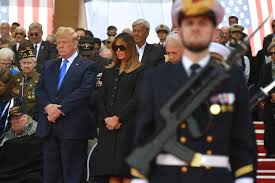
London: Weaving a harrowing narrative of the mission to storm the Normandy shore in an attempt to retake Europe from the Nazis, President Donald Trump on Thursday hailed D-Day veterans as “among the very greatest Americans who will ever live.”
In a speech laced with individual stories of extraordinary heroism and loss, framed by the aging faces of those who experienced it, Trump memorialized an event that changed the course of the war.
Embracing frail veterans making what could be their final journey to the windswept bluffs where they made history, the President appeared genuinely moved by the weight of what had happened there.
And he buttressed an alliance system that emerged from the violence, despite having in the past questioned some of the institutions forged from the bloodshed.
“You are the glory of our republic and we thank you from the bottom of our hearts,” Trump said in remarks at the Normandy American Cemetery in northern France.
“These men enlisted their lives in a great crusade, one of the greatest of all times,” he said. “Their mission is the story of an epic battle and the ferocious eternal struggle between good and evil.”
Speaking after his French counterpart Emmanuel Macron, Trump said the country’s debt to the veterans who participated in the landings was “everlasting.”
“Today we express our undying gratitude,” Trump said.
Trump is the latest in a string of presidents to mark the anniversary of D-Day in France, each successive ceremony seeing fewer and fewer of the veterans who carried out the harrowing mission make it back to the blustery cliffs and stretches of sand.
Now in their 90s, and of a thinning generation with first-hand memory of the war, those veterans joined Trump and other world leaders to mark the occasion near the American cemetery at Colleville-sur-Mer.
Trump singled out Russell Pickett, the last known survivor of Company A, among the first waves of American infantrymen who landed on Omaha Beach.
In his Army cap and standing with the help of a cane, Pickett rose to embrace the President after Trump recounted his story.
“Tough guy,” Trump said after sharing quiet words with the veteran.
Later, Trump sits for talks with Macron before departing for his golf course in Ireland, where he is spending two nights.
In his speech, Trump said the commemoration ceremonies on the cliffs and beaches of Normandy were meant to honor the men — many just teenagers — who lost their lives there.
“We come not only because of what they did here, we come because of who they were. They were young men with their entire lives before them,” Trump said.
Born a year after the fighting ended, Trump is a beneficiary of the post-war prosperity those veterans’ gallantry helped provide. And while Trump this week has already hailed the heroism of the Allied forces, he also downplayed the very notion of obligatory military service, saying his own avoidance of the Vietnam War was because he “was not a fan of that war.”
The comment, and Trump’s habit of desecrating certain war heroes while wrapping himself in the militaristic elements of his position, colored Thursday’s appearance, which comes after a state visit to the United Kingdom.
During his three-day stay in London, Trump’s hosts sought to underscore the importance of the western alliance and the geopolitical systems that were put in place after the war — some of which, like NATO and the European Union, Trump has questioned.
British Prime Minister Theresa May gifted the President a copy of the Atlantic Charter, which defined US and UK goals for the war and its aftermath.
Queen Elizabeth II, staunchly apolitical, said during a toast that the international institutions created after the war were as necessary as ever.
“While the world has changed, we are forever mindful of the original purpose of these structures: nations working together to safeguard a hard-won peace,” she said.
Appearing wowed by the trappings of royal hospitality, Trump has hailed transatlantic alliances during his gracious public appearances.
He repeated those affirmations in his remarks on Thursday.
“Our cherished alliance was forged in the heat of battle, tested in the trials of war, and proven in the blessings of peace,” Trump said. “Our bond is unbreakable.”
A day earlier, Trump stuck closely to script when he appeared onstage to read a prayer during a commemoration ceremony in Portsmouth, on the English south coast.
“Our sons, pride of our nation, this day have set upon a mighty endeavor, a struggle to preserve our Republic, our religion, and our civilization, and to set free a suffering humanity,” Trump intoned before dancers emerged to the upbeat strains of “Boogie Woogie Bugle Boy of Company B,” the wartime ditty sung by the Andrews Sisters.
His reading came from a radio address President Franklin D. Roosevelt delivered on the evening of the Normandy landings.
But even under the weight of history, Trump has also lashed out at all manner of foes, including potential 2020 rival, Democrat Joe Biden, Bette Midler and the mayor of the city in which he was staying.
Confronted during an interview with his own avoidance of war during Vietnam — he received a draft deferment for bone spurs in his foot — Trump revealed a view that questioned the idea of service as a national obligation.
“Well, I was never a fan of that war, I’ll be honest with you. I thought it was a terrible war,” Trump said. “I thought it was very far away.”
Usually, presidents seek to rise above partisan sniping when overseas or marking moments of historic significance — or both, as Trump is doing this week.
His divided mindset was apparent as he was preparing to depart Ireland for France on Thursday morning.
Quoting a Fox News host and close friend, Trump vented that mainstream media outlets weren’t covering his UK visit positively enough.
Two minutes later, it was history on his mind.
“A big and beautiful day today!” he wrote.

